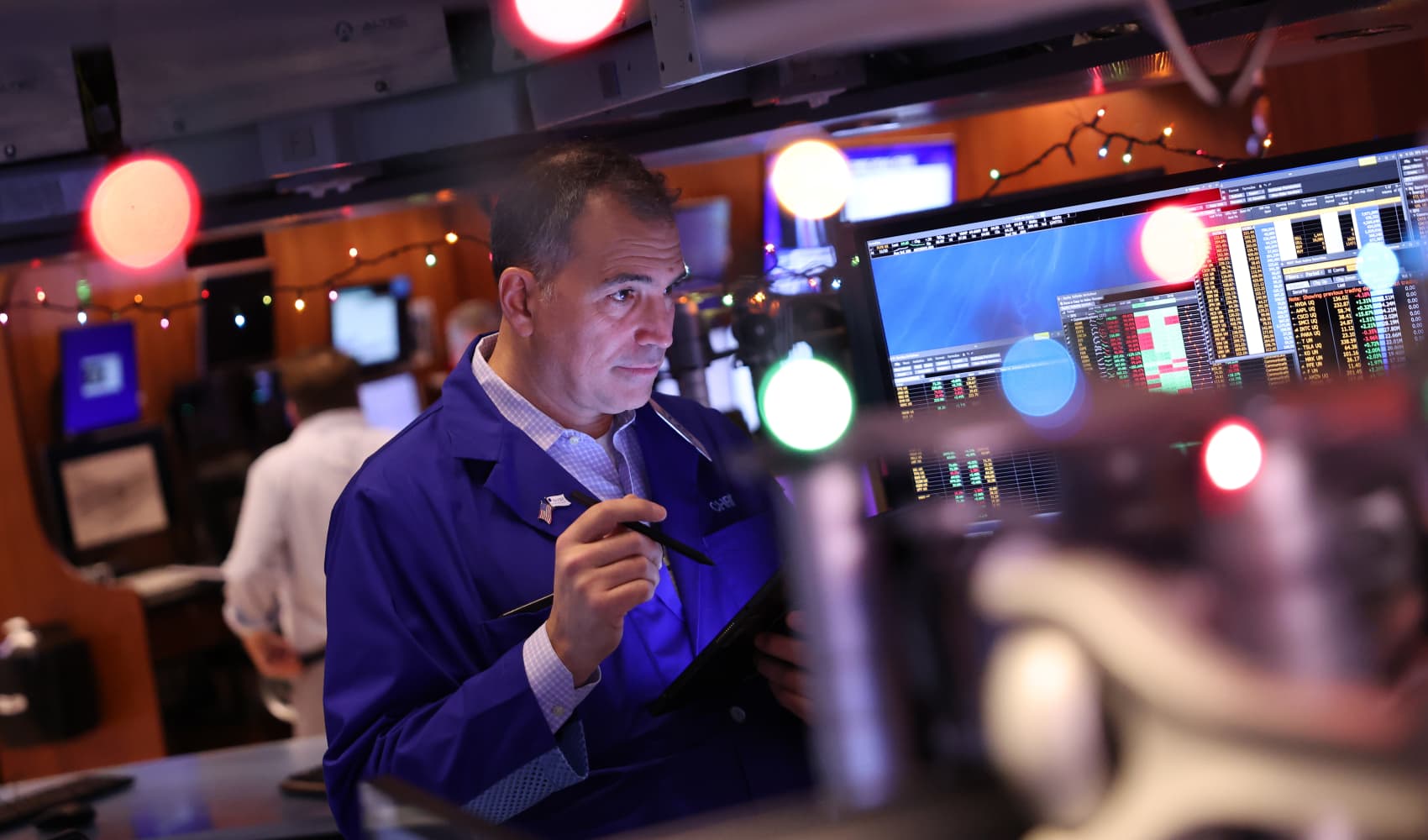
The US Treasury building in Washington, DC, US, on Tuesday, Aug. 15, 2023.
This report is from today's CNBC Daily Open, our new, international markets newsletter. CNBC Daily Open brings investors up to speed on everything they need to know, no matter where they are. Like what you see? You can subscribe here.
What you need to know today
Mixed markets
U.S. stocks traded mixed Monday, with the Dow Jones Industrial Average the only major index to rise. Europe's Stoxx 600 gained 0.75%, with almost all sectors and major bourses in positive territory. Siemens Energy shares popped 6% on reports the German government will provide a financial guarantee to safeguard the company's order book.
Consumer spending fell
U.S. October retail sales, excluding autos and gas, fell 0.08% month on month, while core retail, which excludes restaurants, declined 0.03%, according to the new CNBC/NRF Retail Monitor. The data differs from the Census Bureau's retail sales report as it's the result of actual consumer purchases — analyzing over 9 billion anonymized credit and debit card transactions — while the Census relies on survey responses.
We've got the news you need to know to start your day. Sign up for the First & 4Most morning newsletter — delivered to your inbox daily. >Sign up here.
Exxon invests in green tech
Exxon Mobil, one of the world's largest oil and gas companies, said it aims to become a leading producer of lithium for electric vehicle batteries. The company will kick off this plan through a drilling operation it's launching at a geological site it purchased earlier this year in southern Arkansas. Exxon said it will produce battery-grade lithium at the site as soon as 2027.
Jumbo Emirates order
Emirates Airline is ordering 95 Boeing aircraft in a deal worth $52 billion. Dubai's state-owned flagship carrier is ordering 55 Boeing 777-9s and 35 777-8s, bringing the airline's total orders for the 777X widebody jets to 205 units. This is the first major deal of the 2023 Dubai Airshow.
[PRO] Streaming wars
Streaming services are proliferating: there's Netflix, Max, Disney+, Hulu, Prime Video — to name just a few. With such a crowded field, it's no surprise competition is stiff and winners are scarce. But the sheer number of streaming services vying for viewers isn't the only reason why Warren Buffett thinks it's a tough industry.
Money Report
The bottom line
This week will be a significant one for markets. October's consumer price index comes out later today, while U.S. President Joe Biden will meet his Chinese counterpart Xi Jinping in person for the first time since last November. Investors, focused on the week ahead, are already shrugging off bad news from last week.
On Friday, Moody's Investors Service cut its ratings outlook on the U.S. government from stable to negative. The ratings agency pointed to the country's large fiscal deficits and the political polarization within Congress as risk factors for Treasurys.
Moody's move wasn't entirely new. (Standard & Poor's and Fitch have issued similar cautions.) And even if it were, it's hard to imagine investors spontaneously pivoting from U.S. Treasurys — the world's largest and most liquid market.
"If we go from triple-A to double-A, what does that practically mean? … There's still going to be demand for U.S. Treasurys en masse," as Michael Reynolds, vice president of investment strategy at Glenmede Investment Management, put it.
Indeed, Treasury yields hardly budged Monday despite Moody's warning. The yield on the 10-year note ticked up 1 basis point to 4.638%, while that of the 2-year shed around 3 basis points to end at 5.033%.
Stocks didn't experience major turmoil, either. In fact, the S&P 500 was mostly flat, the Dow Jones Industrial Average added 0.16% and the Nasdaq Composite slipped 0.22%. Trading volume, based on the SPDR S&P 500, was below the 30-day average.
Today's CPI report is likely to cause more gyrations for stocks. Economists expect October's prices to rise 0.1% from September, and 3.3% from a year earlier.
If numbers come in close to or lower than the estimate, that'll please investors because it means the Federal Reserve might be done with rate hikes for the year — or for the whole cycle, the optimistic will say.
As Goldman Sachs strategist Peter Oppenheimer said, the "good news is that inflation and interest rates now appear to have peaked and our economists continue to expect a soft landing. This backdrop is benign for equity markets, reducing the downside risks for investors."
Of course, reduced headwinds don't mean a smooth journey ahead. With the Israel-Hamas war still developing and economic data in the U.S weakening, risks persist.
— CNBC's Jeff Cox contributed to this report.



